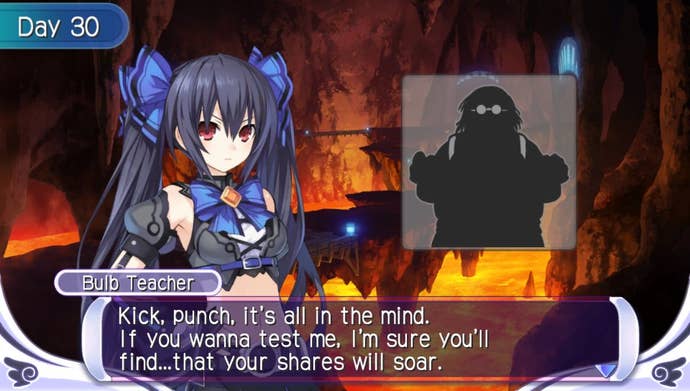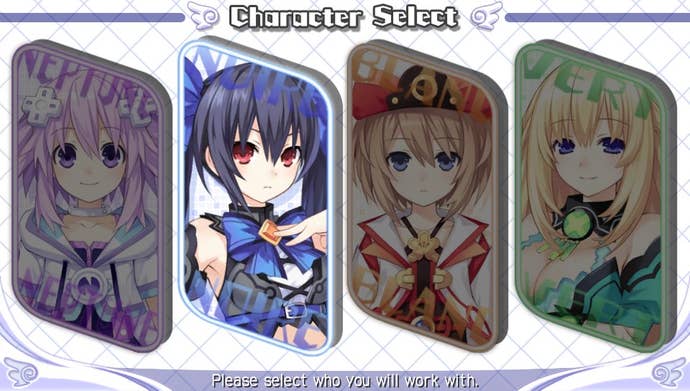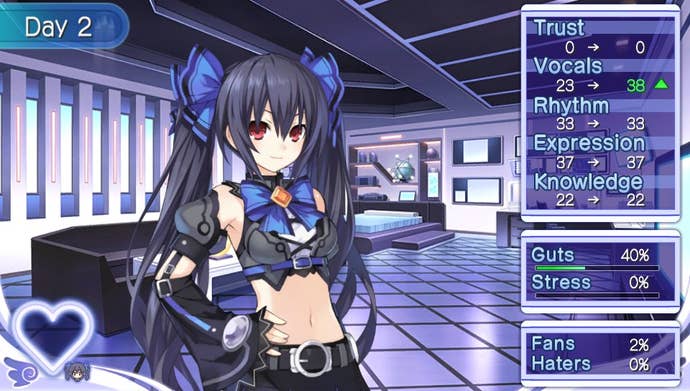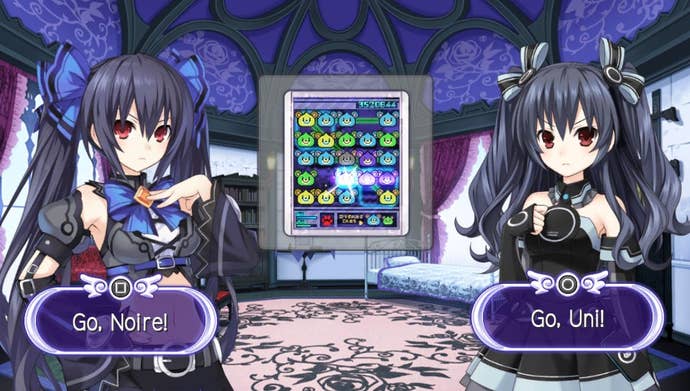JPgamer: Producing Perfection
The latest in the Hyperdimension Neptunia series sees the goddesses trading their swords for microphones. Does it really produce perfection?
This article first appeared on USgamer, a partner publication of VG247. Some content, such as this article, has been migrated to VG247 for posterity after USgamer's closure - but it has not been edited or further vetted by the VG247 team.
As regular readers will know, the Hyperdimension Neptunia series is my guilty pleasure.
Actually, scratch the "guilty" bit -- after playing the main three games in the series and getting stuck into new Vita title Hyperdimension Neptunia: Producing Perfection this week, I really do feel like it's genuinely become one of my favorite series of games, despite each installment's numerous flaws.
It's a series that has grown and changed over time -- from the interesting custom combo-based combat system, bizarre mid-battle item crafting system and repetitive dungeon crawling of the original game to the refined, speedy and downright fun battle system of most recent mainline installment Hyperdimension Neptunia Victory -- but one thing that has remained constant is the tone and characterization.

For those less familiar with the series, Hyperdimension Neptunia as a whole is a series founded on satire and parody. Poking fun at everything from the console wars to the tropes of anime, moe and otaku culture, the series is perhaps a little "inside baseball" for those not already entrenched in the subject matter it's lampooning, but for those already on the same page it's a goldmine of witty jokes -- expertly localized by NIS America -- along with clever takedowns of popular culture's inherent absurdity and, more than anything, wonderfully memorable, eminently huggable characters.
The main, all-female cast of Hyperdimension Neptunia consists of the "Console Patron Units" (or "CPUs) -- goddesses who rule over the countries that make up the land of Gamindustri. Each CPU is the personification of one of the major console manufacturers: Lastation goddess Noire's tsundere nature and desire to always be the best represents Sony and its PlayStation brand; Leanbox's blonde-haired, big-boobed, stereotypically "foreign" (from a Japanese perspective, as depicted in anime) goddess Vert represents Microsoft and the Xbox; Lowee's grumpy, sullen, insular and bookish goddess Blanc represents Nintendo. Both Noire and Blanc have little sisters representing their respective handheld incarnations -- Noire's sister Uni dresses like a PSP and is constantly trying (and failing) to live up to her big sister's expectations, while Blanc's twin sisters Rom and Ram represent both the DS and Nintendo's family-friendly nature. Meanwhile, title character Neptune represents the canned Sega console of the same name, while her sister Nepgear embodies the Game Gear.
The highlight of the series, for me, has always been these characters and how they interact with one another. Which is why I was so excited to finally get my hands on Producing Perfection, a game which drops the mainline installments' RPG mechanics and instead is -- well, ostensibly it's an idol management game, but in practice it's roughly equal parts life sim, dating sim and visual novel. In other words, it's a game that ditches combat entirely in favor of character-centric stat raising and interactions.
And, for those already in love with the goddesses of Gamindustri, it's a wonderfully enjoyable, indulgent experience.

Unlike other installments in the series, in which the story tends to focus on Neptune and Nepgear, in Producing Perfection you play as yourself. Summoned to Gamindustri by the combined efforts of the four goddesses, you're tasked with making them stars in an attempt to unseat the seemingly all-conquering idol group MOB48 -- a play on real-life idol group AKB48 and, in all likelihood, a sly dig at the rise of mobile gaming, too. You do this by acquiring "shares" -- a concept which has been used throughout the whole Neptunia series to reflect the proportion of the world's populace that worships one of the four goddesses or, in times of crisis, someone or something else. To acquire shares, you need to grow your selected goddess' fanbase. To do that, you need to raise her skills, put on concerts and organize publicity events, but at the same time you need to ensure that she doesn't get stressed out.
There's also a relationship mechanic at play, allowing you to become closer with both the goddess you choose to manage at the outset of the game and the other characters you'll run into, such as the other goddesses and their sisters. In doing so, you'll see various special scenes and learn more about the characters and their relationships with one another. Eventually, you'll be able to get the goddesses to team up and form an idol group, with the eventual aim being to lead them to as much success as possible by the time the in-game deadline of 180 days is up.

There's plenty of stat-crunching and behind-the-scenes die-rolls going on while you're choosing what to do with your selected goddess each day, but the main appeal element of the game is the opportunity to just hang out with your favorite character and enjoy their company. Since Noire is my personal favorite -- I have a soft spot for a tsundere -- I elected to jump right in to her route through the game and, in between managing her career and encouraging her to develop her skills in a suitable direction, I've had the opportunity to taste her cooking, go shopping with her, give her a taste of "tough love" when she was becoming complacent and plenty more besides. Your interactions with your selected goddess are all of the fairly typical "dating sim" mold -- right down to the obligatory "oh no, we're in a crowd getting squished together, her boobs are pressing against my back" scene that it's apparently compulsory to include in every vaguely slice-of-life work from Japan -- but since they all involve established characters who, in the past, we've only ever had the opportunity to look in on from outside (not counting Neptune's habit for breaking the fourth wall), it feels kind of like getting the chance to hang out with someone famous whom you'd previously only ever thought you'd be able to see from a distance.
That's sort of the point of the game, really: true to form, Producing Perfection has more than its fair share of satire in its script, in this case taking a sidelong glance at idol culture in Japan. Although manufactured pop groups are nothing new in the West, idol culture takes this to a whole other level. As you work with your goddess, you'll be responsible not only for the development of her skills, but also ensuring her carefully crafted public image doesn't slip. In Noire's case, she's more than happy to jump in with both feet, taking every opportunity for sexy cosplay shoots, the recording of "specialist" CDs in which she says nothing but onii-chan! ("big brother!") in a variety of different tones and television appearances to talk about how great she is. If anything, you occasionally have to hold her back somewhat from getting too carried away, but for the most part it seems I have at least been doing a reasonable job so far, just under halfway to the 180-day deadline.

Thus far, then, I've been greatly enjoying Producing Perfection -- and by gosh, it's addictive. The temptation while writing this article to just pick up my Vita and see how Noire was doing was so enormous I had to go and put it in a different room. Although mechanically simple and arguably lacking in gameplay depth as a result, "gameplay" isn't really the reason to play Producing Perfection, as strange as that might sound. Rather, the point is to give Neptunia fans the opportunity to spend some enjoyable one-on-one time with their favorite goddesses -- and in that regard it most certainly delivers in spades.
Full review coming soon.
